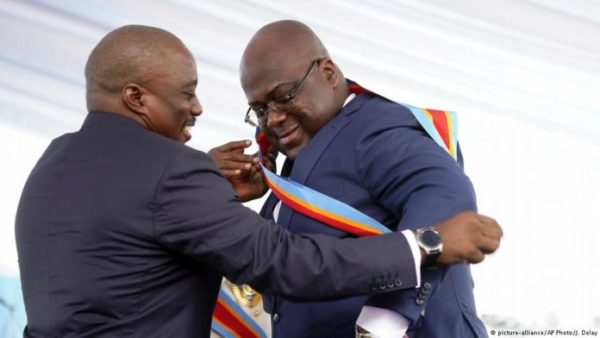[This content has been subject to several regular amendments during the investiture ceremony.]
The outgoing President of the Democratic Republic of the Congo (DRC), Joseph Kabila passed this Thursday the power to his successor Felix Tshisekedi during an inauguration ceremony held at the Palace of the Nation, ceremony meanwhile interrupted following a unease of the new president in full speech. He had just taken an oath before the Constitutional Court in the presence of his predecessor, who in turn handed him the symbols of power: historical.
“This Thursday, January 24th is a great day,” said Tshisekedi in his keynote speech. “We do not celebrate the victory of one side against another,” he added, before promising that the DRC “will not be a Congo of division, hatred or tribalism”.
“We want to build a strong Congo,” said the new president who has “committed to comply with constitutional obligations.” Not without greeting several actors including his opponent Martin Fayulu, the outgoing Joseph Kabila and his father Etienne Tshisekedi.
The only big announcement that comes out of this speech about half an hour remains the future census of “political prisoners” by the Minister of Justice for their next release.
Elected December 30, 2018 with 38% of the votes according to official figures, the new president will officially take the country’s orders for a five-year term renewable once under the constitution. Of the 17 heads of state invited to take part in the ceremony, only Kenyan Uhuru Kenyatta made the trip. A disavowal for Felix Tshisekedi, commented one.
Arrived at the ceremony on Thursday without his salt and pepper goatee and the hair he had been keeping for several months, Joseph Kabila had called the day before in a message of about 15 minutes broadcast on national television, political forces from the elections of the December 30 to form a coalition for a “strong and prosperous Congo”.
“Thanks to the mobilization of all our people, to the ongoing dialogues with the political and social forces, to the action of our valiant defense and security forces – each day better equipped, more professional and efficient – to a diplomacy acting, courageous institutional reforms including the decentralization and the recent revision of the mining code, and a rigorous monetary policy and public financial management, the country was pacified and reunited, the economy stabilized, then relaunched, the reconstruction committed , […] and unprecedented progress in democratization and the establishment of the rule of law, “he said.



